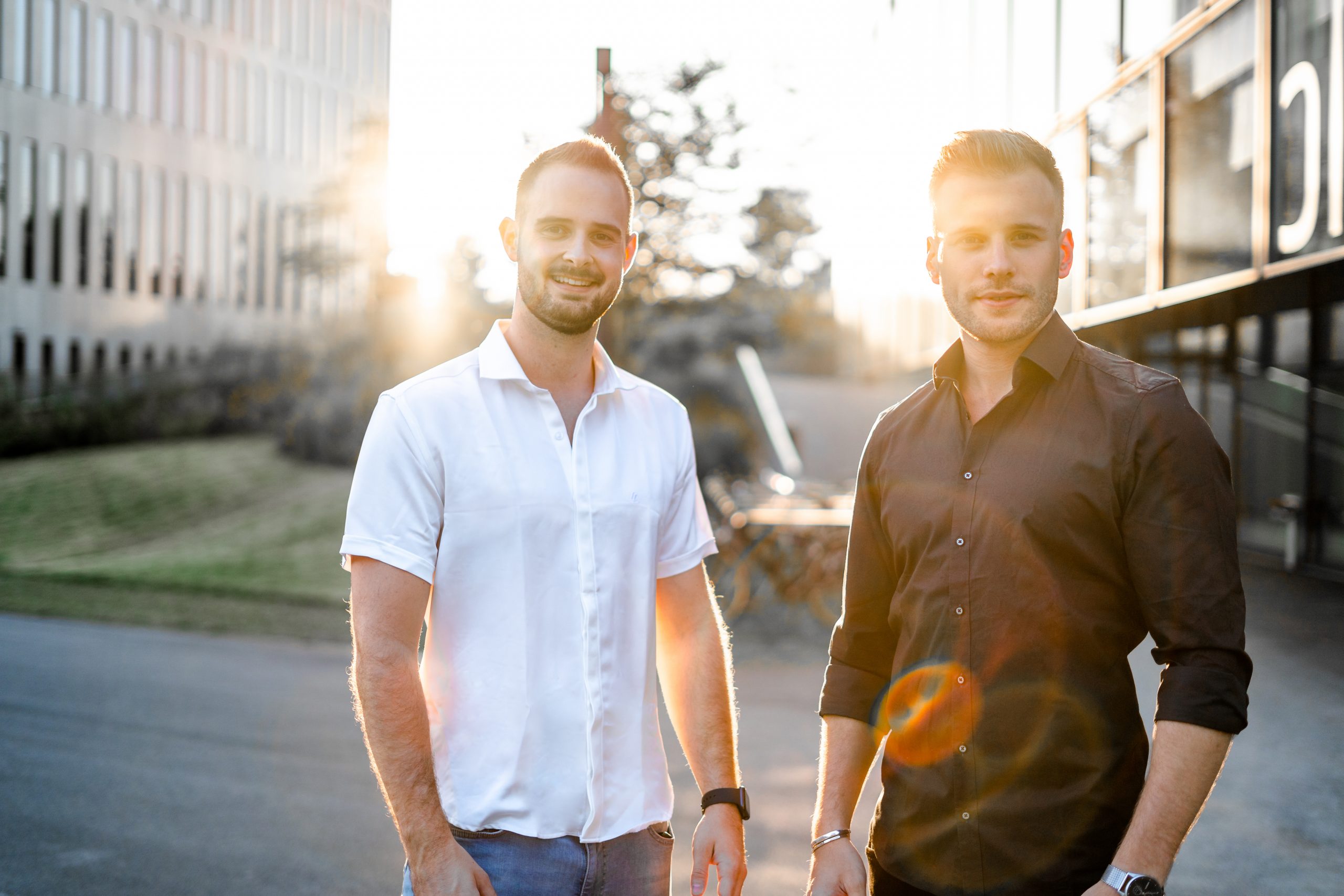On our journey through the start-up world, we meet experts from the most diverse fields time and again. They all have one thing in common: they are passionate entrepreneurs and know what moves and drives the startups of this world.
Today we introduce Alexander Giesecke to you. He is CEO and founder of simpleclub. He is working with his co-founder Nikolai Schork in the field of EdTech on a start-up with enormous potential. Just recently Alexander was voted among the “Top 30 under 30” by Forbes.
Why did we choose this particular founder as interview partner? It turns out that our views on entrepreneurial thinking and acting are a perfect fit. We work according to the same mindset and aim to pass this on to many people. Founders like Alexander encourage the curiosity to try an idea out for yourself, exactly what we need in our society!
EdTech is also an exciting topic for Campus Founders. Due to our proximity to the education campus, which brings together more than ten research and educational institutions in Heilbronn, we deal with Education Tech a lot. We are excited about the developments in this promising sector and are happy to share the interview with you.

Question 1: Alex, simpleclub is one of the most successful learning apps in Germany and your YouTube videos alone have millions of hits. What do you want to achieve next?
We want to build simpleclub so that we get away from the “afternoon market” and be perceived as more than just an additional product for learning. We want to enter the school market and really be recognized as a product that can be used in the classroom. We want to be integrated into “real life” when the lessons take place on site. At the same time, we are there when schools close and lessons have to be replaced. This is exactly what we experience in the times of Corona. We will make sure that we produce content of the highest quality. Schools and parents will later have the choice between the classic textbook and a digital learning offer like simpleclub.
Question 2: What drives you personally to become bigger and more successful?
Our greatest motivation to this day is the feedback from our users. Through simpleclub we are now in very close contact with pupils and students who share their personal stories with us. This motivates us incredibly, because we have noticed that the school system does not prepare students at all for later life – not only in terms of the content itself, but also in terms of the skills you learn. You will have to be able to do totally different things in terms of innovation and in terms of creativity than the school teaches students today. And what motivates us additionally: it is always so great to see how much potential young people have. We have been to many events where we have seen how much talent and ability there is behind fourteen or fifteen year olds. It’s madness if that can’t be fostered just because the school system is not designed for it. And this is exactly what motivates us, not only to make simpleclub bigger and more successful, but also to change the whole system at the same time.
Question 3: What exactly do you want to change?
Through simpleclub we want to change how knowledge transfer works in a concrete way by developing a digital learning offer that is complementary to school and makes knowledge transfer more efficient. We believe that every student needs an individual learning journey. The foundation is based on the previous knowledge, predispositions and learning methods of the individual student. We also want to be able to provide teachers with a tool that enables them to make this knowledge transfer much more efficient. As a result, the role of the teacher must change and instead of the playing the role of transferer of knowledge, they must take on a mentoring role. The knowledge transfer is then taught via a digital tool like simpleclub. We believe that there is a huge potential here, because we observe that young people intrinsically bring with them a great deal of motivation, which is currently being somewhat driven out by the school system.
Question 4: You started your business at school age, did you actually have any help in building your company?
We have been developing the company from our school days and thus slipped a little bit into entrepreneurship without realizing that we were actually starting up. So we had no help in the sense of a mentor. Nevertheless, we had great supporters on our way, who gave us the right input at the right moments. But in the end it was all learning by doing and we also believe that we could have done the whole thing a bit faster if we had had someone to show us every step right from the start. But that’s mostly a utopia anyway. That’s why everything was learning by doing.
Question 5: What fascinates you about entrepreneurship?
What fascinates me about entrepreneurship is the freedom to develop what you want and to really make a small contribution to changing the world. That sounds a bit cheesy, but in the end that’s exactly what motivates us. When we think about what education looks like today and what it might look like in the future, we are not in a position where we can just complain and hope that something will change, but we are in a position of responsibility and have the opportunity to change something. This is a situation in which we have one hundred percent responsibility.
Question 6: There are more and more initiatives that encourage and support young entrepreneurs. What do you think about this?
Nico and I are also shareholders in the non-profit organization Startup Teens. This is precisely about teaching young people to think and act entrepreneurially. We don’t want to push young people in the direction of having to start up a business and achieve sales. After all, it is not always primarily about building up profit-oriented companies. Rather, it is about the mindset behind it and it is also an attitude towards life that is transferred to all other areas of life. For us personally, that means always going full throttle, finding the best way to help others and maintaining a positive basic attitude that something can change.
Many have the basic attitude that life is unfair and bad. We see things completely differently. I am sure that this positive thinking is a basic building block of entrepreneurship and it is important to keep telling yourself “we can change everything here”.
Question 7: What advice would you give to each founder?
I believe it is the combination of the omnipresence of one’s own vision and the knowledge about the path of entrepreneurship. In our case, the first attempt to achieve a goal was rarely successful. In other words, we set out to do something, then we took the path and in the end it didn’t lead directly to success. We always had to find another way. But that’s exactly how you make sure that your strategies improve, that you grow with them and that the final result improves in the end. In the end it is this combination of “have your vision in your head and believe in it even if nobody else believes in it” and the knowledge that it will always take several ways until you reach your goal without being intimidated by the process.
Question 8: Do you believe that everyone can learn to be entrepreneurial?
I do indeed believe so. Some people have the idea that there are general types of entrepreneurs. And then there are people who are not those types. I think that in the end it is perhaps more of a fundamental decision, if you know all the possibilities, whether you really want to take on the responsibility in this form or would rather be in an employed job, which is not meant to be judgmental at all. But in my opinion, entrepreneurial thinking in itself is a skill you can learn. Because to me, thinking entrepreneurially means solving problems in the best way you can think of – and that’s best for a whole range of people. And to work to influence the entrepreneurial mindset of people, as you do at Campus Founders, is super important and just makes sense.

Question 9: You want to become the number one EdTech start-up in Europe. Do you believe that it is possible to found a leading EdTech Startup from Germany? Would it not be easier for you in the USA?
I am absolutely convinced that we can found THE leading EdTech Startup out of Germany. We have a federal system in Germany and have already had to crack 16 states. Of course, these systems are much more similar to each other than if you compare big countries, but learning how to map 16 different systems helps us to crack this very heterogeneous education market internationally.
Each school system is clearly different from the others, however, we produce content on the smallest building blocks that can be put together like a puzzle. So we had a great test environment in Germany, which allowed us to learn what the implementation in other countries could look like. Therefore, I am of the opinion that I have the best possible basic situation to create something here in Germany. We are also really proud that we will do this from Germany. And would that have been easier in the USA? To be honest, I don’t know. Maybe if it had been founded in the USA, I would say the exact opposite and say “Ah, USA was the best foundation for us”.
Question 10: EdTech is getting more and more attention. Do you think this could be the next big boom market for startups?
Definitely. I think this was already evident three years ago in India when the first big EduTechs started there. The world’s largest EduTech BYJU’S, which is now valued at 11.3 billion US dollars, shows how incredibly large this market can become. It has to be said that this Indian company is really only available in India and not really available in other countries yet, but is already valued at over 11 billion. That is why I believe that the education market is one of the largest markets of the future. That is also because it allows for a super large number of sub-sectors. On the one hand, there is the K12 market in which we are active. Then there is the post-secondary sector, i.e. towards university and beyond that, education within the company itself. The principle behind this large market is that with the technologies we have today, we are able to make education so much more efficient than it is today. On the one hand, we have a huge responsibility, and on the other hand, we have huge market prospects.
Thank you very much, Alex, for the detailed interview. We keep our fingers crossed for your further plans and will follow them with great interest!